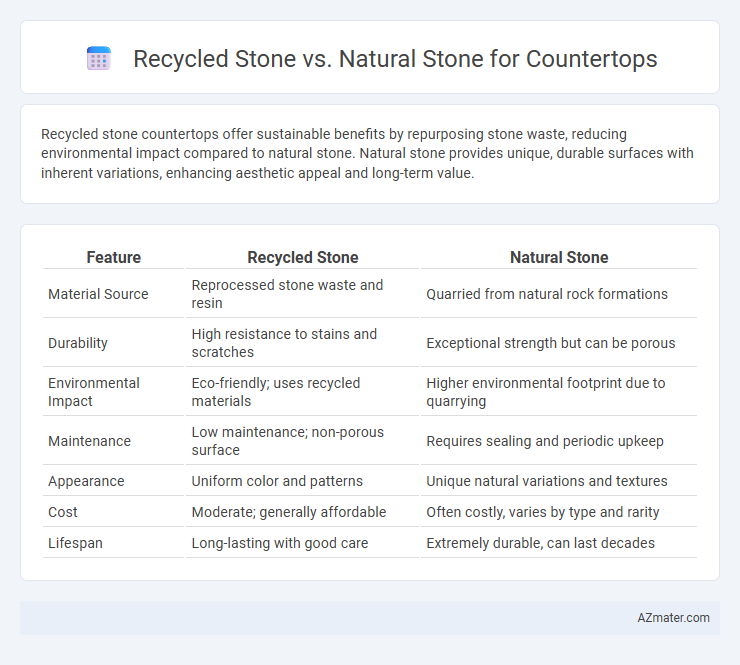Recycled stone countertops offer sustainable benefits by repurposing stone waste, reducing environmental impact compared to natural stone. Natural stone provides unique, durable surfaces with inherent variations, enhancing aesthetic appeal and long-term value.
Table of Comparison
| Feature | Recycled Stone | Natural Stone |
|---|---|---|
| Material Source | Reprocessed stone waste and resin | Quarried from natural rock formations |
| Durability | High resistance to stains and scratches | Exceptional strength but can be porous |
| Environmental Impact | Eco-friendly; uses recycled materials | Higher environmental footprint due to quarrying |
| Maintenance | Low maintenance; non-porous surface | Requires sealing and periodic upkeep |
| Appearance | Uniform color and patterns | Unique natural variations and textures |
| Cost | Moderate; generally affordable | Often costly, varies by type and rarity |
| Lifespan | Long-lasting with good care | Extremely durable, can last decades |
Introduction: Recycled Stone vs Natural Stone Countertops
Recycled stone countertops are crafted from repurposed materials such as crushed glass, concrete, and stone fragments, offering an eco-friendly alternative to natural stone. Natural stone countertops, including granite, marble, and quartzite, provide unique patterns and durability sourced directly from quarries. Choosing between recycled and natural stone depends on factors like sustainability goals, budget, and desired aesthetic characteristics for kitchen or bathroom surfaces.
What is Recycled Stone?
Recycled stone is a sustainable countertop material composed of crushed natural stone fragments combined with resin or cement binders to form durable slabs. It repurposes waste materials such as marble, quartz, and glass, reducing environmental impact compared to quarrying natural stone. This eco-friendly alternative offers similar aesthetics and strength to natural stone while minimizing resource depletion and landfill waste.
What is Natural Stone?
Natural stone, sourced directly from quarries, consists of materials like granite, marble, and limestone, known for their unique patterns and durability. These stones are cut and polished to create countertops that offer timeless elegance and high resistance to heat and scratches. Their composition and origin provide natural variations, making each countertop distinct and valued for aesthetic authenticity.
Sustainability and Environmental Impact
Recycled stone countertops, made from reclaimed materials like concrete, glass, and stone fragments, significantly reduce landfill waste and lower carbon emissions compared to quarried natural stone. Natural stone extraction involves intensive mining processes that cause habitat destruction, high energy consumption, and substantial greenhouse gas emissions. Choosing recycled stone supports circular economy principles, decreases demand for virgin materials, and minimizes overall environmental impact in sustainable countertop design.
Durability and Longevity Comparison
Recycled stone countertops often incorporate crushed natural stone bound with resins, providing high durability resistant to scratches and stains, though their longevity depends on resin quality and maintenance. Natural stone materials like granite and marble offer exceptional hardness and heat resistance, with proven durability lasting decades when properly sealed and cared for. Both options require periodic sealing to maintain surface integrity, but natural stone generally outlasts recycled stone in terms of overall lifespan due to its inherent composition.
Aesthetic Differences and Design Options
Recycled stone countertops offer a unique, contemporary aesthetic with vibrant patterns and color variations resulting from mixed materials like glass, quartz, and concrete, providing versatile design options not typically found in natural stone. Natural stone, such as granite, marble, or quartzite, features organic, timeless veining and color gradients that bring a classic, luxurious feel to countertops with each slab uniquely patterned by nature. Design flexibility with recycled stone includes customized color blends and finishes, while natural stone excels in traditional elegance and inherent durability for statement-making kitchen surfaces.
Cost Differences: Recycled Stone vs Natural Stone
Recycled stone countertops typically cost 20-40% less than natural stone options like granite or marble due to lower material and processing expenses. Natural stone involves higher extraction and transportation fees, driving up the overall price. Choosing recycled stone offers a budget-friendly alternative without sacrificing durability or aesthetic appeal.
Maintenance and Care Requirements
Recycled stone countertops require less maintenance than natural stone because they are non-porous, resisting stains and bacteria without the need for regular sealing. Natural stone, such as granite or marble, demands periodic sealing and careful cleaning to prevent staining and damage from acidic substances. Choosing recycled stone reduces long-term upkeep costs and simplifies daily care with its enhanced durability and stain resistance.
Installation Process and Considerations
Recycled stone countertops often require specialized installation techniques due to their lightweight composition and potential for variable thickness, making precise handling and adhesive selection critical. Natural stone, such as granite or marble, demands skilled labor for cutting, sealing, and setting heavy slabs to ensure durability and proper edge finishing. Considerations include the need for reinforced support structures under natural stone and the environmental benefits combined with easier maintenance when choosing recycled stone.
Choosing the Right Countertop for Your Needs
Recycled stone countertops offer an eco-friendly alternative with durable surfaces composed of crushed natural stone and resin, ideal for sustainability-conscious homeowners. Natural stone such as granite or marble provides unique, timeless aesthetics and high heat resistance, catering to those valuing classic elegance and long-term investment. Evaluating factors like environmental impact, maintenance, durability, cost, and design preferences is essential to choose the right countertop material for your kitchen or bathroom needs.

Infographic: Recycled stone vs Natural stone for Countertop
 azmater.com
azmater.com